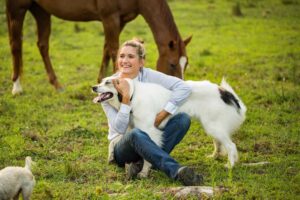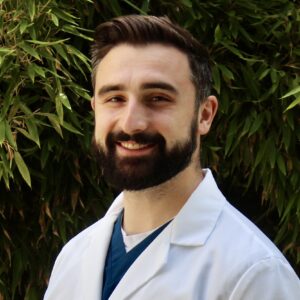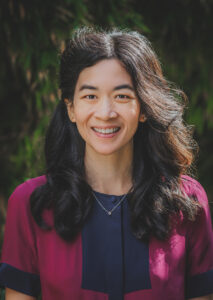Past Events
Equine Medicine
Brigid McCarthy, DVM
Starwood Equine
Special interest: equine internal medicine, general care, and dentistry.
Trained and certified through the International Veterinary Chiropractic Association
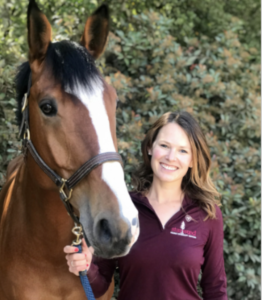
Suturing Workshop
Monika Huss, DVM, MS
provided hands-on training on suturing!
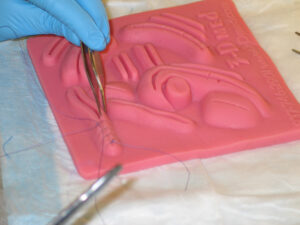
UC Davis School of Veterinary Medicine Application Process
- Admission requirements and the selection process for interviews
- The Multiple Mini Interview (MMI) format and tips for preparation
- An overview of the veterinary curriculum and additional educational opportunities
- Key components of a successful application and advice for crafting a strong submission
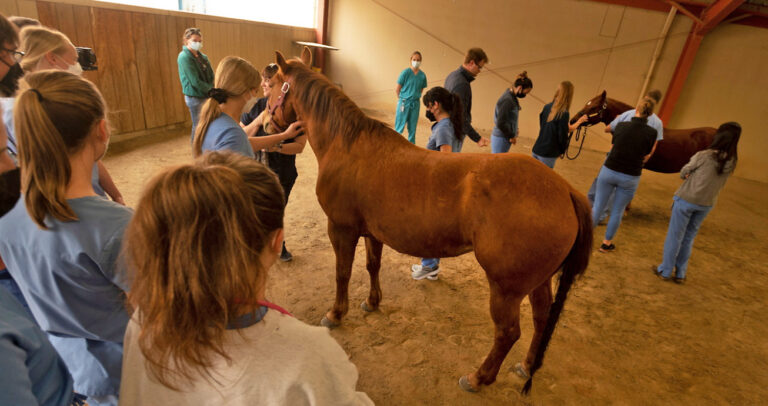
Credit: Gregory Urquiaga
Problem Based Learning in Veterinary Medicine
Dr. Morrill grew up in Maine working at his family’s seafood market. He completed his undergraduate education at Colby College. He went to veterinary school at Western University of Health Sciences, where he received his DVM in 2022. He is currently a third-year ACLAM resident here at Stanford.
Bachelor of Veterinary Biology/
Doctor of Veterinary Medicine
Studying at Sydney University
Bianca Waud, DVM, PhD, FHEA
Associate Professor in Applied Companion Animal Genetics, and
Tamara Kirby, School Manager
The University of Sydney
Sydney School of Veterinary Science – Faculty of Science
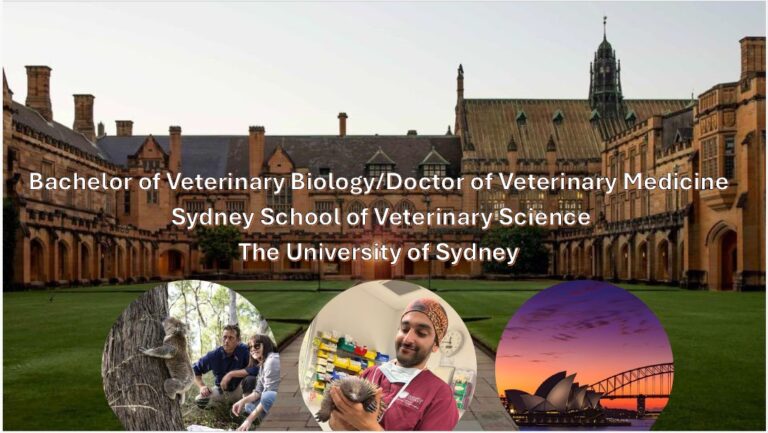
Fun Biology Across Species
Dr. Heng attended UC Davis for veterinary school and received ACLAM board certification after residency training in laboratory animal medicine at Stanford University. She then completed her PhD thesis in neuro-ophthalmology at Stanford, studying optic nerve protection in a pig model of traumatic optic neuropathy. She is currently a Clinical Assistant Professor and the Director of Large Animal Services in the Department of Comparative Medicine at Stanford University.
The Evolution of a Veterinarian: From Rural Clinics to the Frontiers of Genome Sequencing
John Gorzynski, DVM, PhD, is a veterinarian and scientist at Stanford Medicine with a unique journey. Growing up on a small farm in New York, John knew he wanted to pursue a career in medicine, however, it was only after his undergraduate studies that he discovered his passion for veterinary medicine. This led him to study at the University of London’s Royal Veterinary College, where he delved into veterinary medicine and surgery, and started a research project focused on genetic causes of cardiovascular disease in great apes. After graduating and gaining further clinical experience as a mixed-animal surgeon in Wales, John’s curiosity about the clinical applications of genetics prompted him to pursue a PhD at Stanford University. Balancing his roles as a researcher and an emergency veterinarian, John has contributed to groundbreaking genome sequencing techniques, investigated heart diseases in great apes like the renowned gorilla Koko, and achieved a world record for the fastest genome sequencing technique. Currently, he is focused on advancing genetic diagnostics research to improve the health of both humans and animals.
Veterinary Experiences and 2023 Summer Updates!
In the first meeting of the 2023 Fall quarter, Katelyn Santa Maria Amisha Iyer, and Sofia Ceva presented their summer experiences:
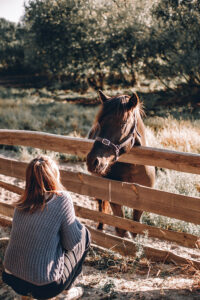
Dr. Clare Sherman,
Emergency Veterinarian
at Sage Veterinary Center
Dr. Sherman received her bachelor’s degree with honors from Stanford University in 2012, where she studied Environmental Science and Biology as a pre-veterinary student. She went on to earn her doctorate in veterinary medicine from Cornell University in 2017. After graduating from veterinary school, Dr. Sherman decided to pursue further specialty training, and completed a small animal rotating internship at the Veterinary Specialty Hospital in San Diego. There she worked closely with the Cardiology, Neurology, Ophthalmology, Surgery, Internal Medicine, Emergency and Critical Care specialists, and developed a love for emergency medicine. After completing her internship, she started a residency in Emergency and Critical Care at Colorado State University. She enjoyed working with students and the challenging cases there, but quickly realized she was ready to leave academia and start her career back in San Francisco. Dr. Sherman moved back to the Bay Area, and now works as an Emergency Veterinarian at SAGE Veterinary Centers. She enjoys collaborating with her many specialist colleagues as well as spending time with many of them outside of work. In her spare time, she likes cooking, camping, and traveling with her fiance. They have one rescued cat named Max.
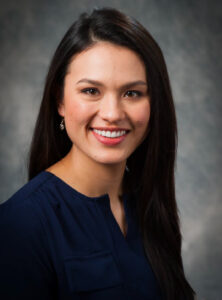
Choosing a Vet School
Natalie Celeste, DVM, MPH
Dr. Natalie A. Celeste is a California native. She earned her Bachelor’s in Animal Science from Cal Poly Pomona. She went on to complete a dual degree DVM-MPH program at Ohio State University. She found her love for laboratory animal medicine during veterinary school which led to where she is today as a veterinary resident at Stanford.
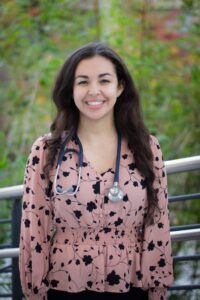
Swine Veterinarian's Role
Mike Kuhn, DVM, MBA
Dr. Kuhn earned a master’s degree in Business Administration in 2004 from the University of Iowa and graduated from Iowa State University’s College of Veterinary Medicine in Ames in 1983 with his Doctor of Veterinary Medicine.
Mike Kuhn, DVM, is a swine veterinarian who has owned his own practice and worked for a leading animal health company. He lives in Westminster, Colorado, and currently consults with swine-related companies.
Sarah Jones, Owner of Red Hill Farms
Sarah Jones of Allen County in Kentucky has been named the 2022 KFB (Kentucky Farm Bureau) Farm Woman of the Year. The award honors outstanding achievement of a woman actively engaged in production agriculture. Recipients personify the highest level of professional excellence in agriculture.
Sarah and her husband Bart own Red Hill Farms, an esteemed livestock and crop farming operation spanning south central Kentucky and northern middle Tennessee. Not only does Jones oversee the sale and care of Red Hill’s many cattle, but she also manages its finances, records, marketing and promotions.
Caitlyn Sullivan, Barn Tour Guide
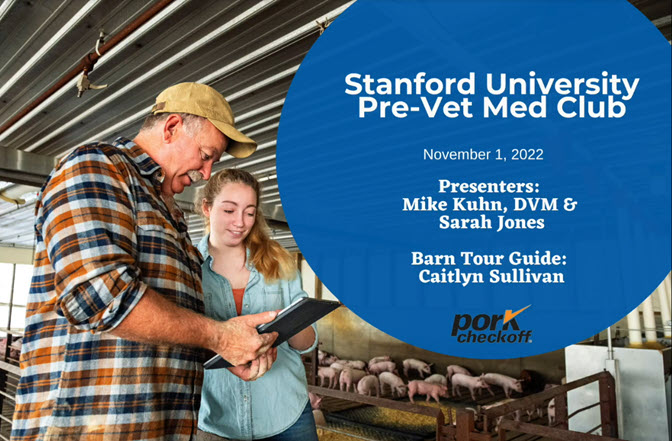
The Wildlife Rehabilitation Process
Ashley Kinney, Hospital Manager
Ashley Kinney is the Hospital Manager at WCSV, and has spent 24 years working with animals– 20 of those years as a volunteer and employee with WCSV. Kinney started working with animals at the age of 11, working with non-releasable animals used for education. From there, she knew she wanted to start rehabilitating wild animals. At the age of 16 she started volunteering at WCSV. In 2006, she then became a staff member, and the rest is history. Kinney enjoys giving animals a second chance at life. These animals are admitted due to human impact, and having the ability to help them overcome injuries, and release them back to the wild makes every minute worth it. She also enjoys working with a great team of passionate employees and dedicated volunteers who are all here for the animals.
Ashley Damm, Wildlife Supervisor
Ashley Damm is a Wildlife Supervisor with WCSV. She has been a wildlife rehabilitator since 2012. After graduating with a degree in biology, she interned with US Fish & Wildlife Service. She focused on waterfowl and bat research, and fell in love with wildlife. She considers hand-rearing songbirds the most fulfilling part of wildlife rehabilitation.
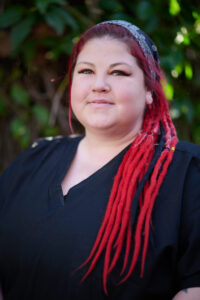
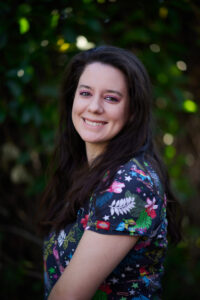
Shelter Medicine in San Jose
Dr. Tyson has worked in a variety of shelters since 1994. She graduated from Stanford in 1997 and from the University of California, Davis School of Veterinary Medicine in 2003. Since 2004 she has been with the City of San Jose Animal Care and Services where she established a shelter medicine program and spay/neuter clinic for the city’s newly built shelter. In the summer of 2016, she collaborated with a Stanford pre-veterinary student to establish a monthly clinic for pets of the homeless.
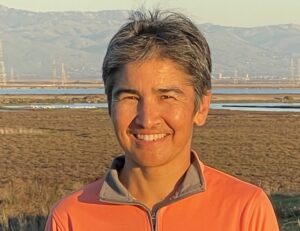
Life as an Equine Practitioner
Dr. Erin Trawick attended Barnard College before getting her DVM at Tufts University in 2012. She planned to pursue lab animal medicine but realized she preferred the outdoor time provided by equine ambulatory medicine. She started a mobile general equine practice, Millington Equine, in CT in 2018. She is also trained in acupuncture. Dr. Trawick spends her spare time riding her own mare, weeding her many gardens, or chasing her naughty cats.
